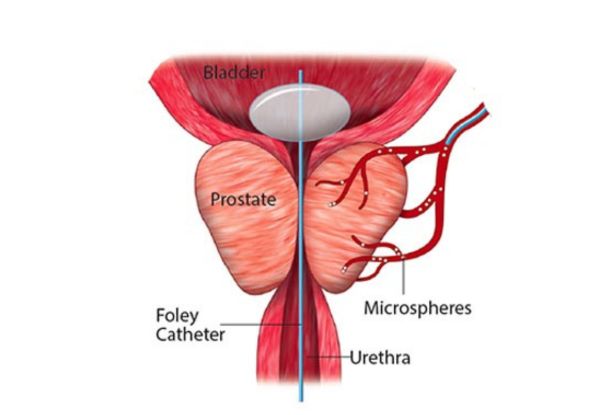
When dealing with prostate issues, you might have heard about Prostate Artery Embolization (PAE). But is it the best decision for you? Let’s dive into what PAE is, who it’s for, and how to decide if it’s the best option for your prostate health.
What is Prostate Artery Embolization?
Prostate Artery Embolization (PAE) is a minimally advanced procedure used to treat benign prostatic hyperplasia (BPH), often known as enlarged prostate. This PAE therapy includes cutting off the blood supply to the prostate gland, which can help reduce its size and alleviate uncomfortable symptoms such as frequent urination, trouble commencing urination, and weak urine flow.
How It Works: During the procedure, a small catheter is inserted into a blood vessel, typically in the groin or wrist. The catheter is carefully guided to the arteries supplying the prostate. Tiny particles are then placed into these arteries, blocking the blood flow. Without the extra blood, the prostate shrinks and symptoms often improve.
Benefits of PAE:
- Minimally Invasive: Unlike traditional surgery, PAE doesn’t require large incisions.
- Reduced Symptoms: Many patients experience significant relief from their BPH symptoms.
- Short Recovery Time: Most people can return to normal activities fairly quickly.
Who is an Ideal Candidate for PAE?
PAE is often considered for men with moderate to severe BPH symptoms who haven’t found relief from medications or other non-surgical treatments. Here’s who might benefit from this Prostate Artery Embolization Treatment:
- Symptoms: Men suffering from frequent urination, urgency, and a weak urine stream may find relief with PAE.
- Health Conditions: Those with a history of certain health conditions might need to avoid PAE. Always discuss your complete medical history with your doctor to ensure PAE is safe for you.
Contraindications:
- Severe Heart or Lung Conditions: Men with serious heart or lung issues might not be suitable for PAE.
- Certain Infections: Active infections in the urinary tract or prostate could complicate the procedure.
Factors to Consider Before Choosing PAE
Severity of Prostate Symptoms: Consider how much your symptoms impact your daily life. If symptoms are severe and other treatments haven’t worked, PAE might be worth exploring.
Risks and Complications: While PAE is generally safe, it does come with some risks. Possible side effects include:
- Pain: Some discomfort or pain in the groin area after the procedure.
- Urinary Issues: Temporary changes in urination habits.
- Infection: As with any procedure, there is a risk of infection.
Effectiveness of PAE: PAE has a high success rate for reducing symptoms. However, results can vary. Many men experience significant relief, but it’s essential to understand that some might need additional treatments or follow-ups.
Comparing PAE with Other Treatment Options
Medication vs. PAE: Medications are usually the first treatment for BPH. They can be effective but may have side effects and might not work for everyone. If medications aren’t enough, Prostate Artery Embolization could be the next step.
Surgical Alternatives: There are several surgical options for BPH, such as Transurethral Resection of the Prostate (TURP). These can be more invasive than PAE but might be necessary for severe cases. PAE is less invasive, making it a suitable option for some men who want to avoid surgery.
Making the Decision
Consulting a Specialist: Speak with a urologist to discuss whether PAE is right for you. Your doctor will evaluate your symptoms, overall health, and treatment history to help determine the best course of action. If you’re looking for top-notch diagnostic services, consider visiting Midas Care Clinic, renowned for offering advanced Prostate Artery Embolization Treatment.
Personal and Lifestyle Considerations: Think about your personal preferences and lifestyle. Some men prefer less invasive options like PAE to avoid more invasive procedures.
Conclusion
Deciding if Prostate Artery Embolization is the right choice for you involves understanding what the procedure entails, who it’s suitable for, and how it compares to other treatment options. Always consult with your healthcare provider to make an informed decision based on your specific needs and health condition. For a thorough evaluation, you might want to visit the Best diagnostic center in Vasai to ensure you get the best advice and treatment options available.

